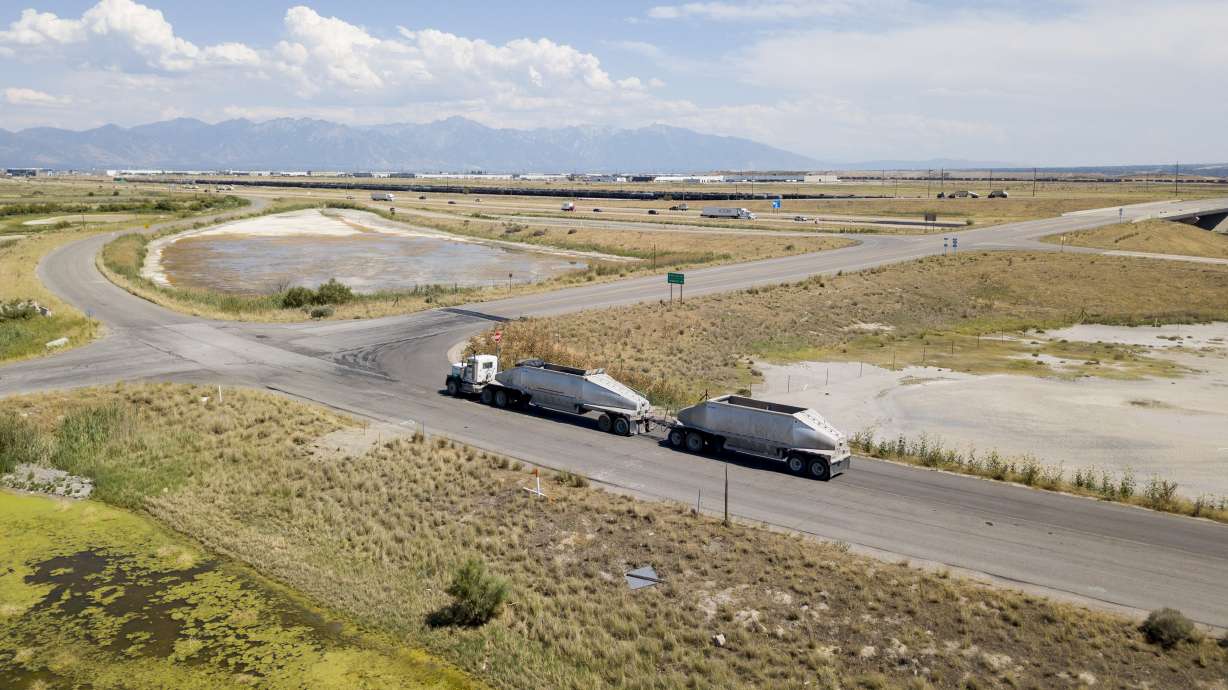Estimated read time: 4-5 minutes
This archived news story is available only for your personal, non-commercial use. Information in the story may be outdated or superseded by additional information. Reading or replaying the story in its archived form does not constitute a republication of the story.
SALT LAKE CITY — After pumping the brakes last month to respond to a constant barrage of public concern, the Utah Inland Port Authority Board's wheels have started turning again.
The port board during its fourth official meeting Thursday approved its first-ever tentative budget of nearly $2 million and gave thumbs up to a series of other actions, including moving forward with developing a business plan, establishing a committee of experts to advise the port authority, and hiring an interim administrator to take the wheel while the board searches for an executive director.
"The inland port is a once-in-a-generation opportunity to ensure Utah's place as a center of commerce for the Western United States," Derek Miller, the board's chairman and president, who is also CEO of the Salt Lake Chamber, said in a prepared statement. "The first step in creating a successful project is to build a successful organization, and today we took steps to ensure that success."
Thursday's votes were mainly administrative as the board took its next steps to create a massive global trade hub in Salt Lake City — a project expected to be the state's largest ever, and state leaders have pushed despite a power struggle with Salt Lake City.
In contrast with other meetings, the port board's Thursday meeting drew less fervor, after board leaders adjusted the proposed budget to address some complaints raised last month about the budget's lack of specificity.
Of the $1.5 million in one-time funds provided by the state for setup and $475,000 in one-time state funds set aside for economic development planning, the port authority board budgeted $852,500 for operating expenses and put the remainder in a reserve fund to hold until the board has more "clarity" with how to spend it, Miller said.
"This is an important step forward," Miller said after the board unanimously voted to adopt the draft budget. "Per legislation, we cannot make any expenditures until we have a budget in place, so it feels good to finally have a budget in place."
The budget's operating expenses include the $475,000 set aside for a business study plan — for which the board voted to move forward with soliciting bids for a contractor to conduct the study — as well as $100,000 to hire an interim administrator to help "guide" the board over the next several months while it continues to operate without a director, Miller said.
The budget also included $100,000 to pay for a contract with a firm to conduct a search for the executive director, as well as $100,000 for "community engagement" and $75,000 for legal services.
Dorothy Owen, a former state budget analyst and chairwoman of the Westpointe Community Council — who has been one of the most vocal critics of the inland port — thanked board leaders for the changes to the budget.
Read more:
"You obviously took it very seriously, and that's important to let us have a better understanding of this," Owen said, calling the reserve fund an "innovative" solution to issues the board is facing while it continues to get up and running.
Among other actions, the board also voted to adopt a proposal from Miller to create a "technical committee" to advise the board on technical issues.
The committee, expected to see appointees at the board's next meeting, will be made up of officials from the Utah Department of Transportation, the Utah Department of Environmental Quality, the University of Utah's Kem C. Gardner Policy Institute, the Wasatch Front Regional Council, and a person representing rural Utah oil, gas and mining interests.
Some tension rose between board members when discussing the formation of the committee, after board member Rep. Francis Gibson, R-Mapleton, expressed concerns about the technical committee "poking holes into why this isn't going to work." Gibson was appointed to the board by House Speaker Greg Hughes.
Gibson's comments came after board member Lara Fritts, Salt Lake City Mayor Jackie Biskupski's economic development director, suggested the mayor's administration participate in the technical committee so it could share its work already done in master planning the area.
Fritts noted members of Biskupski's administration have "always been supportive" of an inland port, but the concern was "over the way (legislation) was handled."
In turn, Gibson said, "lawsuits abound." He referenced Biskupski's public comments about how port authority critics will "have our day in court," calling the legislation that created the board "unconstitutional" because of how it stripped the city's ultimate land use authority.
"You can't be threatening lawsuits on one (hand) and be overly helpful on the other," Gibson said.
Fritts replied, "Please know that I cannot speak for the mayor but what I can speak for is the staff I've worked with to help move forward the idea of an inland port."
While the threat of a lawsuit has lingered, no groups have acted — something that likely will have to wait until the port authority takes a contestable action, Biskupski has said.
And in case that day in court comes, the port board now has money to face it. Though it's not yet clear what attorney the port authority will hire, it now has $75,000 budgeted to pay for legal contracts, if need be.











